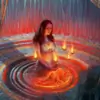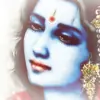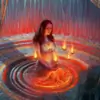Now coming to the KMG bit of her birth-
And there arose, after this from the centre of the sacrificial platform, a daughter also, called Panchali, who, blest with great good fortune, was exceedingly handsome. Her eyes were black, and large as lotus-petals, her complexion was dark, and her locks were blue and curly. Her nails were beautifully convex, and bright as burnished copper; her eye-brows were fair, and bosom was deep.she resembled the veritable daughter of a celestial born among men. Her body gave out fragrance like that of a blue lotus, perceivable from a distance of full two miles. Her beauty was such that she had no equal on earth. Like a celestial herself, she could be desired (in marriage) by a celestial, a Danava, or a: Yaksha. When this girl of fair hips was born an incorporeal voice said, 'This dark-complexioned girl will be the first of all women, and she will be the cause of the destruction of many Kshatriyas. This slender-waisted one will, in time, accomplish the purpose of the gods, and along with her many a danger will overtake the Kauravas.” (KMG trans., Adi Parvan -169)
Now please see, @bold part. What is important is, Vyasa does not here state explicitly see was born OUT OF FIRE, but from the middle of a sacrificial bed ie Vedi.
Sanskrit Mahabharata goes - Vedi Madhyat Samutthita. (These lines are a part of the original Sanskrit MB)
So, what is technically impossible here is she being born out of burning fire- which as per Vyasa, never happened.
Now take a look at Swayamvar of Drau-
"Vaisampayana said, …The illustrious Yajnasena, otherwise called Drupada, had a daughter risen from the centre of the sacrificial altar. Of eyes like lotus-petals and of faultless features endued with youth and intelligence, she is extremely beautiful. And the slender-waisted Draupadi of every feature perfectly faultless, and whose body emitteth a fragrance like unto that of the blue lotus for two full miles around, is the sister of the strong-armed Dhrishtadyumna gifted with great prowess--the (would-be) slayer of Drona--who was born with natural mail and sword and bow and arrows from the blazing fire, himself like unto the second Fire. And that daughter of Yajnasena will select a husband from among the invited princes.(KMG trans., Adi Parvan -186)
Again, note that she isn't born out of raging fire. What we gather here-
- Draupadi was born a grown-up
- She was born from “Vedi” of Yajna - vedi.madhyaat.samutthitaa
- She was not born directly from Fire – but she sprung from the centre of the Fire-Altar - vedi.madhyaat.samutthitaa. It is interesting that Mahabharata does not inform us whether Draupadi was born when the fire was still ablaze, or when the fire had extinguished on the completion of the Yajna.
The myth that Draupadi was born of Agni as a grown-up is contradicted by many references in the Mahabharata where Draupadi is said to have a normal childhood.
For example, it is mentioned in Adi-Parva (1.157.14) Draupadi was born in Drupada’s dynasty –
01,157.014a drupadasya kule jata kanya sa devaruupinii
01,157.014c nirdishta bhavatam patnii krshna parshaty anindita
If Draupadi was born from Yajna-Agni or Vedi, how could the poet say - drupadasya kule jata kanya? Born in dynasty - kule jata – applies only if Draupadi is normally born in Drupada’s dynasty.
A similar reference is found in Vana-Parva (3.280.32) -
03,028.032a drupadasya kule jatam snusham pandor mahatmanah
03,028.032b*0097_01 Dhristadyumnasya bhaginiim viirapatniim anuvratam
03,028.032c mam te vanagatam drshtva kasman manyur na vardhate
Again - drupadasya kule jatam
Some might argue that Draupadi born from Yajna would still make her drupadasya kule jatam - because the Yajna was after all performed by Drupada.
In Vana-Parva, Draupadi tells about herself that she and her brothers had a natural childhood – and this is conclusive proof from Mahabharata-Text that Draupadi had a normal birth and childhood -
“My father formerly kept a learned Brahmana with him. O bull of the Bharata race, he said all this unto my father. Indeed, these instructions as to duty, uttered by Vrihaspati himself, were first taught to my brothers. It was from them that I heard these afterwards while in my father's house. And, O Yudhishthira, while at intervals of business, I went out (of the inner apartments) and sat on the lap of my father, that learned Brahmana used to recite unto me these truths, sweetly consoling me therewith!”
03,033.055a evam samsthitika siddhir iyam lokasya bharata
03,033.055c citra siddhigatih prokta kalavasthavibhagatah
03,033.056a Brahmanam me pita puurvam vasayam asa pan?itam
03,033.056c so 'sma artham imam praha pitre me bharatarshabha
03,033.057a niitim brhaspatiproktam bhrat?n me 'grahayat pura
03,033.057c tesham samkathyam ashrausham aham etat tada grhe
03,033.058a sa mam rajan karmavatiim agatam aha santvayan
03,033.058c shushruushamanam asiinam pitur anke yudhishthira
If Draupadi could sit on her father’s lap (pitur anke), she, certainly, could not have been born a grown-up!
Once, when Krishna refers to Draupadi-putras as child, he says:
“Your father and your uterine brothers proffer them a kingdom and territories; but the boys find no joy in the house of Drupada, or in that of their maternal uncles.
03,180.024a rajyena rashtraish ca nimantryamanah; pitra ca krshne tava sodaraish ca
03,180.024c na Yajnasenasya na matulanam; grheshu bala ratim apnuvanti
The word ‘sodar’ suggests same womb. Vyasa could not have used that word (and that too in none other than Krishna’s voice!) had Draupadi been born otherwise.
Krishna’s words clearly indicate that Draupadi had a normal birth in mother’s womb, and all her brothers were born normally too in the same womb – including Dhristadyumna.
































